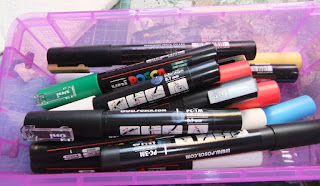The gesso having dried to a nice matt finish, we can now proceed with the actual painting.
There is usually a base colour to apply, for example white for the 18thC French we'll meet in a moment or beige to represent the faded olive on these North Koreans. Slap on the base coat with a big - size 5 or so - brush.
My standard for painting is something like the Britains Deetail range. These WW2 Americans featured in a previous post - only the chap in the middle is an actual Deetail figure (with his original paintwork).
I ditched enamel paints back in the 1990s and now use acrylics. While I mostly use Vallejo paints, I look out for cheaper paint for the colours which I'll use a lot of . The 'Crafter's Choice' range can be found in The Works for £1 each.
While the base coat dries be thinking about the 'detail' painting. I use pretty basic references such as the splendid Funcken booksThe NKPA getting similar treatment.
My 'trademark' touch is the mad staring eyes I give all my figures. Apply a white stripe and a dot of black. This can either be done with a fine brush and a cocktail stick, or you can cheat and use...
...paint pens. These are the lazy wargamer's friends.
A different batch of NKPA - this time in as yet unfaded uniforms.The French again. Both eyes and the gold hat trim were added with paint pens.
The bases are now painted - I generally paint them green using Dulux matt emulsion paint. Woodland Fern 1 in fact, which I have mixed to order in a 1-litre tin.
Next - varnish and finishing.











8 comments:
You ought at least to post a wargamers guide to Deetail colours.
Very interesting series, Tim. I aim for a rather similar "toy soldier" appearance for my 1/76 plastics, complete with flat green rectangular bases.
Cheers, Dave
I'm always chuffed when I see someone other than me doing BMC figures. Just a suggestion anent the 'mad staring eyes'. Try giving the dudes eyebrows. That might mitigate the wide eyed 'oh the horror' look. Unless your into the 'don't shoot until you see the white of their eyes' sort of thing...
I thought this series was great until the bug eye thing. A wash with some diluted brown paint or army painter soft tone ink gives the face some definition instead of two giant fried eggs on the face, then again those BMC figures are hard to make look good.
Stephen Briddon
Behave
Dave M
I think we need to see your toy too!
Archduke Piccolo
I like the BMC figures precisely because they lack detail - it make the 'toy soldier' look easier to achieve.
Anon
I'm simply saying what works for me. What I'm aiming for a is a 'toy soldier' look. If I wanted a 'realistic' look I wouldn't have started with BMC figures! Also the mad staring eyes entertain like minded friends and really annoys 'proper' wargamers....
Post a Comment